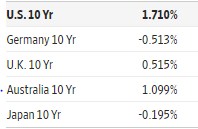A Perfect Storm In The Making
To use the biblical phraseology, trade wars beget currency wars, currency wars beget a deflationary cycle, deflationary cycles beget collapsing bond yields and collectively they beget a decline in equities worldwide. Monday’s stock market behavior seems to bear out the truth about this sequence of events. Prior to the opening bell, Chinese and U.S. officials leveled accusations at each other as part of their prolonged trade fight. Then, the Chinese yuan went above 7 /USD, an all-time low, in offshore trading. Accusations continued with China citing that the devaluation is the market reaction to the newest wave of tariffs on consumer goods exported to the US starting September 1st. True to form Trump cried foul, insisting that China is a currency manipulator.
The pessimism generated by the trade and currency adjustments has extended into the world bond markets. Bond yields around the world also extended their recent retreat, a sign of a negative economic outlook. It was just about nine months ago that the US 10-year bond yield was 3.2%, only to plunge to 1.71% today, one of the steepest declines in recent years. German and Japanese bonds have extended their yields deeper into negative territory, as sovereign debt becomes the instrument of choice in a world defined by deflation. Worldwide, over $12 trillion of government debt trades at negative yields. Many analysts are calling for deeper rate cuts from the Fed, although the lower rates engender fear that a serious economic slump is upon us.
(Click on image to enlarge)

Selected World Bond Rates, August 5, 2019
By the close of Monday’s trading day, the Dow was down 3%, the FTSE dropped 2.5%, and the Hang Seng was off by 2.9%. No regional exchange was spare the downdraft. So why this plunge in equities and why now?
Clearly, there will be no China-US trade rapprochement before the next election (even longer if Trump is re-elected) and the consequences are only now sinking in with equity traders. We have seen that tariffs are starting to hit both countries. Chinese GDP has been slowing for several quarters and the expectation is that this will not only continue but likely accelerate. Although still relatively robust, China’s GDP is averaging around 6% per annum, still the envy of the rest of the world, but below Chinese historical performance. US output has not only slowed but in some key sectors, such manufacturing and agriculture, have started to contract. Both sectors are taking direct hits from the rise in import prices on intermediate goods and from the loss of Chinese markets for basic foodstuffs.
The financial markets are now starting to adjust to the new reality of a prolonged and ruinous trade war in which neither side is about to make concessions. Trump is doubling down on his bet, and the stock market does not like his odds. Although the Federal Reserve has some more room to lower rates, it is dawning on equity participants that the rate reductions are neither the appropriate policy response nor are they anywhere near adequate to deal with the consequences of the trade and currency wars now underway.



